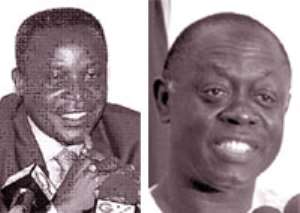
FORMERLY KNOWN as the Gold Coast, Ghana is a young democratic republican nation, which attained political independence from Britain, her colonial masters, on March 6th, 1957, the first black colony, South of the Sahara, to achieve independence and last Tuesday, the country celebrated her 50 years anniversary in grand style.
Osagyefo Dr. Kwame Nkrumah, of blessed memory, led the Convention Peoples Party (CPP) to win power in the general elections of 1956 to become the first Prime Minister and later the President of the first Republic of Ghana. Since then, Ghana's political history has seen democratic elections.
THE STRUGGLE The attainment of independence was the result of long years of struggle by the nationalist movements and personalities who passionately believed that the direction and control of government should be entrusted into the hands of the people and their chiefs.
Be that as it may, in 50 years, Ghana has come a long way as a sovereign nation. By age 50, a nation should have matured and all the teething troubles should be well behind it. Most of the nation's problems stem from people's attitudes, so this is where individuals' contributions must come in. One does not have to be on the parade grounds to show patriotism.
Individual demonstration of nationalism can be complicated. It can be something as simple as a determination by workers to make sure that every day they put in a full day's work at the office to merit pay; or even a vow not to drop litter because it affects the environment. Tolerance, compromise, humility, forgiveness and hard work will water and nurture the democracy that evidently every Ghanaian loves.
Ghana was 50 years old on March 6th, 2007, and it was marked, as I said earlier with pomp and pageantry. After all, Independence Day is a day of national unity when all that is important for a nation is to show solidarity and strength in the pursuit of its economic and political agenda. But as many people thronged places like the Independence Square in Accra, to witness the national parade of soldiers, civilians, school children and public servants, with prayers offered by people of different faiths, it is imperative that the real essence of independence is fully highlighted as well. Fifty years on, Ghana's political independence is still held in check by the lack of economic independence that should have naturally followed the toil by the great fathers of the land many years back.
POLITICS The country is still dependent on primary commodities. Ghanaians appear disillusioned, little aware of what really the future holds for them. The cost of living is very high. What worries me most is the fact that instead of people sitting down to look at real issues, the whole situation is so much politicized that the issues of importance are just ignored or swept under the carpet. The real battle therefore, for Ghanaians, is for them to fight hard as they did in the days of colonial rule to achieve independence, this time on the economic front. No country will be able to achieve greater success on the economic front when on the political front, the war of words is so bitter that investors feel threatened. It does not help the cause of anyone in this country even now.
CONCLUSION If it is all in the interest of the people, then, politicians must show love for each other, accept defeat in good faith and continue to promote common goals to help economic growth and developments in the country as a whole. For now, Ghana has political independence but not economic independence. The single biggest challenge facing Ghana today is the need for the “attitudinal character of Ghanaians” to “change for the better”. It would never bear fruit unless Ghanaians “stopped being so dependent on the government alone and developed greater self – reliance and initiative”. Generally, Ghanaians hope for more of a brighter future.




 2024 election: Don’t be scared; we're ready to maintain law and order – Dampare ...
2024 election: Don’t be scared; we're ready to maintain law and order – Dampare ...
 NDC to officially outdoor Prof Jane Naana as 2024 running mate on April 24
NDC to officially outdoor Prof Jane Naana as 2024 running mate on April 24
 Power outages: Always give 3 days prior notice — PURC to ECG
Power outages: Always give 3 days prior notice — PURC to ECG
 NDC's quest to wrestle power from NPP goes beyond partisanship; it’s a national ...
NDC's quest to wrestle power from NPP goes beyond partisanship; it’s a national ...
 ECG board members slapped GHS5.8 million fine by PURC for failing to alert publi...
ECG board members slapped GHS5.8 million fine by PURC for failing to alert publi...
 I never left NPP, they 'sacked' me for attending Alan's programme; even a $100mi...
I never left NPP, they 'sacked' me for attending Alan's programme; even a $100mi...
 Fuel prices go up today
Fuel prices go up today
 Anti-gay bill: Your stance serves no purpose; either you actively advocate for t...
Anti-gay bill: Your stance serves no purpose; either you actively advocate for t...
 Tension brews as NPP Seattle clashes with national leadership over parallel chap...
Tension brews as NPP Seattle clashes with national leadership over parallel chap...
 Anti-gay bill: You've done nothing in Ghana to prove you're against LGBTQ+; ther...
Anti-gay bill: You've done nothing in Ghana to prove you're against LGBTQ+; ther...
